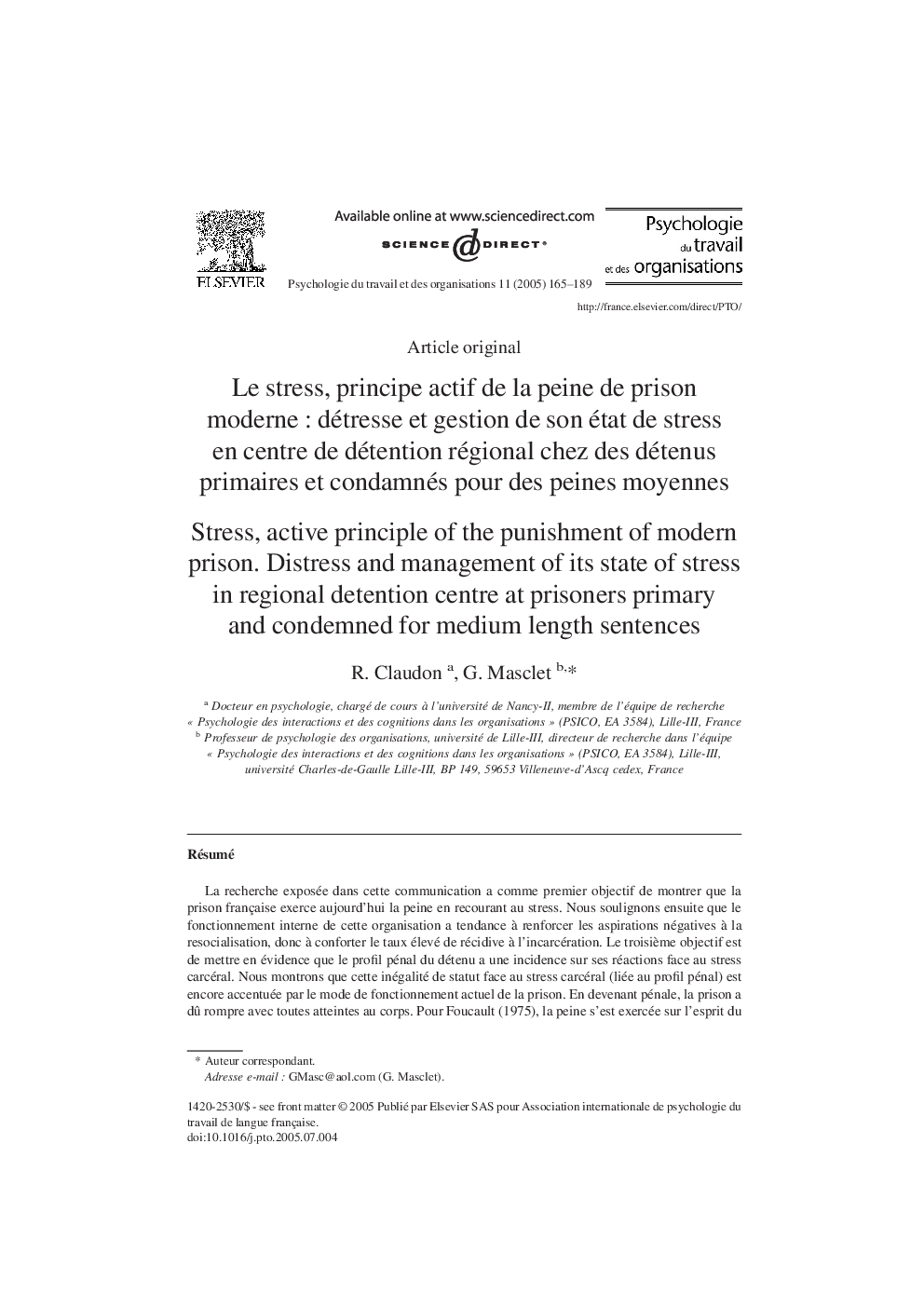| کد مقاله | کد نشریه | سال انتشار | مقاله انگلیسی | نسخه تمام متن |
|---|---|---|---|---|
| 10442402 | 914499 | 2005 | 25 صفحه PDF | دانلود رایگان |
عنوان انگلیسی مقاله ISI
Le stress, principe actif de la peine de prison moderne : détresse et gestion de son état de stress en centre de détention régional chez des détenus primaires et condamnés pour des peines moyennes
دانلود مقاله + سفارش ترجمه
دانلود مقاله ISI انگلیسی
رایگان برای ایرانیان
کلمات کلیدی
موضوعات مرتبط
علوم انسانی و اجتماعی
روانشناسی
روان شناسی کاربردی
پیش نمایش صفحه اول مقاله

چکیده انگلیسی
Research displayed in this communication has as first objective to show that the French prison institutes today the punishment running again to the stress. We underline that the internal functioning of this organization has a tendency to intensify negative aspirations compared to the social reintegration, then to corroborate the raised proportion of second offence following incarceration. The third objective is to make obvious that the penal profile of the prisoner has an impact on his reactions faced with prison stress. We show that this statute inequality facing the prison stress (linked to the penal profile) is stressed again by the current functioning method of the prison. When it becomes penal, the effects of the prison sentence do not show an increasing effect on the subject's physical state. For Foucault (1975), rather, the suffering is felt by the subject's spirit. But how has it continued to constrain? We show that the major pressure imposed by the situation of imprisonment is due to the fact that it manufactures the environment of the prisoner by making it impossible to predict. Therefore, the criminal character of this measure resembles a successive stress consecutive to the impossibility which the subject has to control its environment. Since 1980 s, little by little, European legislation has inspired respect to the French prison world. The prisoner enjoys a lot of individual rights. Why in such material terms of clemency, does the pressure of imprisonment is still felt harshly? To discover it, we are first studying how the modern prison acts as a stressor, then how the prisoner reacts to this situation. The analysis of the organizational and space functioning of a modern Regional Detention Centre (CDR) (existent of “Program 13000”) shows that measurements turned to amendment, and in most cases activities of social reintegration become instruments of subjection. Combined with a specific usage of places, prisoners' actions-at-law multiply in order to obtain “good detainees”, in other words, docile individuals. If they want to escape from this place of stress, the individuals can undertake a re-socialisation activity. Therefore, we put in an obvious place that, today, this penalty exercises over behaviours today and that is acts as a conditioning mechanism based on the stress. We analyse experimentally the distress that show twenty-seven detainees incarcerated for the first time (for burglary or for sexual aggressions) and condemned for medium length sentences (from 3 to 5 years) and the forms of adjustment which they can develop during the first two months which follow the transfer of “Maison d'Arrêt” in CDR. It appears that behaviours led by this organizational modelling constitute a strategy of adaptation to prison much more efficient than the fact to express positive coping (turned to social reintegration). The study of the physiological state of the stress via the production of urinary cortisol over 24 hours puts in an obvious place that the prison does not favour prisoners' aspirations to be inserted in the society. Moreover, this study highlights that the subject's adjusting to the prison stress differs according to the penal profile. The subjects condemned for burglary use these activities more than those condemned for sexual aggressions. They show a more significant reduction of their ratio of urinary cortisol over 24 hours. In addition, in those subjects condemned for sexual aggression, the nature of the adaptive coping (via a decrease in their ratio of urinary cortisol over 24 hours) becomes unpredictable: it varies from month to month during our experiment.
ناشر
Database: Elsevier - ScienceDirect (ساینس دایرکت)
Journal: Psychologie du Travail et des Organisations - Volume 11, Issue 3, September 2005, Pages 165-189
Journal: Psychologie du Travail et des Organisations - Volume 11, Issue 3, September 2005, Pages 165-189
نویسندگان
R. Claudon, G. Masclet,